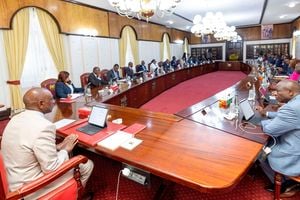
President William Ruto receives certificate from Chief Justice Martha Koome after taking oath of office on September 13, 2022.
Blaming the Judiciary alone for corruption in Kenya is living in denial. Every institution, both public and private and every facet of our lives is affected by corruption. It is in the country’s DNA. It is in the fabric of every official and citizen.
If corruption became extinct today, there are many Kenyans who would stop to breathe or lose their power of speech, because corrupt people don’t know integrity-speak.
The Judiciary, like many institutions in Kenya are hostile places to visit for honourable people. I avoid Kenyan public institutions like a plague because I find the whole aura of such places scary, unwelcoming, and fraught with injustice.
Poor people who lack money to grease the palms of officials behind the brown, dreary wooden panelled receptions for services they really ought to get for free always get a short thrift instead.
Nonetheless, the Executive is being hypocritical and a bully to turn on the Judiciary alone when corruption is rife in all the four arms of government.
It cannot be that the best way to contain a corrupt Judiciary is to behave corruptly by rejecting court orders whose purpose is to stop abuse of power. If the court orders are issued commensurate with the tenets of the constitution, then there should be no cause for the Executive to act vindictively towards the Judiciary.
The example set by the Executive and indeed some legislatures of not adhering to conditions of a court order is already leading to the chaos alluded to recently.
There is nowhere that is more evident than in issues concerning private properties and land, where evictions of ordinary and sometimes poor Kenyans are facilitated by those intent on not respecting the decisions made by the courts in protecting the rights of a party to a land dispute.
This is something that is leading to instability in the communities and in some cases murder by those intent on not respecting the law and grabbing land at any cost. The example being set by elected leaders on not respecting court orders is also a recipe for breakdown in law and order. Spike in violence, crime and corruption is therefore not surprising.
The current Cabinet is largely composed of people whose integrity came under scrutiny due to the allegations of corruption and in some cases even facing murder charges in court. They were approved and appointed to the government despite the disquiet from Kenyans.
The Executive in this regard, ought to have removed the clog out of its eyes first before pointing its fingers at other arms of government on corruption and other integrity issues beguiling them. You cannot walk a high moral ground with a stain on your character.
Since coming to power, the government has failed to show leadership qualities. If anything, they have taken to creating chaos and division in the country by being tribal and playing the blame game. So much time is being wasted in attacking the opposition and even the past regime.
As one Chinese saying goes, "He who blames others has a long way to go on his journey. He who blames himself is halfway there. He who blames no one has arrived.”
There is something quite disingenuous on how the current Executive is going about the business of running the government. The Executive’s complaints, especially around fiscal issues, does not seem to match the reality.
On one hand they decry lack of money and about empty coffers left by the past regime and on the other hand living an affluent life, clearly on tax-payers money. Most importantly, if there are issues of corruption affecting any arm of government, there are right channels set up to deal with those issues. In the case of the Judiciary, that body is the Judicial Service Commission.
There was no need therefore for the Executive to launder our dirty linen in public for the whole world to see. They could have raised their concerns on corruption in the Judiciary through the JSC privately and professionally. The roadside attacks on the Judiciary would only create more mistrust and reduce its credibility even further.
Both the President and his deputy must remember that politics has its time and place, and their main responsibility is not to politic forever but offer leadership to the country for the sake of unity. They are currently behaving in antagonistic fashion towards a country they were elected to lead.
Corruption is a problem across the board, not just within the Judiciary, and it is upon the leadership of the country to strive to end it. Being selective or political around corruption is not helpful in the long run. It is only bound to make a bad situation worse.
The Executive therefore needs a broad-brush approach in ending corruption in all the sectors. But first, it must lead by example by respecting the constitution and the rule of law. Court orders are not personal attacks on the President or some other government official. They are issued to protect the constitution and stop abuse of power.
Ms Guyo is a legal researcher. [email protected]. @kdiguyo










